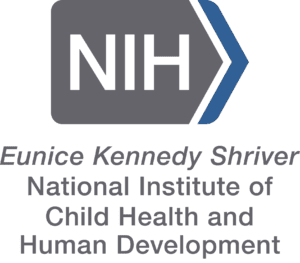
As director of NIH’s Eunice Kennedy Shriver National Institute of Child Health and Human Development (NICHD), Diana W. Bianchi, MD, oversees a broad portfolio of research on pediatric health and development, maternal health, reproductive health, intellectual and developmental disabilities, and rehabilitation medicine, among other areas. She is also a board-certified medical geneticist with special expertise in reproductive genetics and genomics, and she directs an intramural research laboratory in the Center for Precision Health Research at NHGRI. She has been an ASHG member since 1997 and is a former member of the ASHG Board of Directors.
2022 marks a special milestone—the 60th anniversary of NICHD. The Messenger recently spoke with Dr. Bianchi to learn more about the ongoing genetics and genomics research at NICHD and the institute’s efforts to enhance diversity, equity, and inclusion.
What is the role of NICHD in informing researchers and the public about personalized medicine in pediatrics, reproductive health, and rehabilitative medicine?
For the past 60 years, NICHD has been leading research and training to understand human development, improve reproductive health, enhance the lives of children and adolescents, and optimize abilities for all. Our work helps shape the scientific knowledge base for clinical practice recommendations and public health guidance. For example, one of NICHD’s earliest research successes was validating a mass screening test for the genetic disorder phenylketonuria, which led to its widespread adoption for newborn screening. Today, dried blood-spot tests detect a treatable condition in about 13,000 babies each year.
Technological advances are helping us unravel the genomics of clinical conditions and apply this knowledge to detect diseases early and develop targeted treatments. NICHD’s website hosts news about our latest research advances and health information about a wide variety of conditions and diseases within our purview. Interested individuals can also sign up for email updates or follow us on Twitter, LinkedIn, Instagram, and Facebook.
What human genetics research is supported by NICHD and what are the opportunities for applying genetics-based approaches to human development and child health?
Genetics research is a key component of NICHD’s efforts to investigate human development throughout the entire life process. The Institute conducts and supports a broad portfolio of such research and collaborates with other NIH institutes and centers on multiple large-scale genetics projects. For example, the Newborn Sequencing in Genomic Medicine and Public Health (NSIGHT) program, funded from 2013 to 2019, established that genomic sequencing is a useful diagnostic tool for critically ill newborns and helped pave the way for efforts to apply whole-genome sequencing to healthy infants. Currently, NICHD supports the Fetal Genomics Consortium, which brings together existing pregnancy sequencing projects to advance care during and after pregnancy, and to help understand phenotypic variation in single-gene disorders and how different Mendelian disorders present during fetal development. We also collaborate on the developmental Genotype-Tissue Expression (dGTEx) initiative to study gene expression during childhood. Insights gleaned from dGTEx will fill key gaps in our understanding of the role of gene expression in human development and help us better understand disease processes.
Other programs focus on certain conditions or outcomes. For example, the Gabriella Miller Kids First Pediatric Research Program is a large-scale sequencing effort that aims to understand the etiology of structural birth defects and childhood cancers, including the discovery of shared genetic pathways between these disorders. The INvestigation of Co-occurring conditions across the Lifespan to Understand Down syndromE (INCLUDE) initiative supports high-risk, high-reward basic science research on chromosome 21 and promotes inclusion of people with Down syndrome in clinical trials. The Genomic Predictors of Pregnancy Loss initiative is investigating emerging genomic screening approaches to identify variants or mutations that predict risk for embryonic or fetal loss beyond standard karyotype approaches.
Additionally, intramural scientists at NICHD are working to improve diagnostics, develop and evaluate therapies, and identify biomarkers for a range of genetic and hereditary disorders, including Niemann-Pick disease type C, central conducting lymphatic anomalies, osteogenesis imperfecta, and pheochromocytoma. We have half a dozen board-certified geneticists on staff.
These and other NICHD-supported genetics initiatives and projects will bring us closer to fulfilling our vision of ensuring healthy pregnancies, healthy children, and healthy and optimal lives.
What are some of the goals and aspirations for NICHD in the coming years? What most excites you about opportunities for human genetics to improve medicine?
NICHD’s Strategic Plan lays out our scientific research objectives and aspirational goals. In the coming years, genetics and genomics research will play an important role in advancing our understanding of human development and identifying the early trajectories associated with disease.
lays out our scientific research objectives and aspirational goals. In the coming years, genetics and genomics research will play an important role in advancing our understanding of human development and identifying the early trajectories associated with disease.
I am particularly excited about the potential to advance treatments for genetic diseases, especially single-gene disorders. For example, promising therapies, including gene editing approaches, are under development for several forms of muscular dystrophies. As one of the three NIH institutes and centers that co-chairs the Muscular Dystrophy Coordinating Committee, NICHD plays a key role in shaping the federal research agenda for improving treatments and reducing the personal and societal impacts of this group of genetic conditions.
Additionally, as the success of newborn screening programs has illustrated, early detection and treatment of genetic disorders greatly improves survival and quality of life. What if we could intervene even before birth? A recent case report on the successful prenatal treatment of Pompe disease will help pave the way for fetal treatments for other genetic disorders. I look forward to future advances in this area.
NICHD launched STRIVE to improve diversity, equity, and inclusion (DEI) in all aspects of its research and workforce. What are some ways in which NICHD is seeking to reduce or address existing disparities through this project?
NICHD’s STrategies to enRich Inclusion and achieVe Equity (STRIVE) initiative aims to reinforce DEI within the institute’s workforce, foster DEI in the broader scientific workforce and among trainees, and expand health disparities research to develop solutions that mitigate inequities. The STRIVE team is engaging with both internal and external stakeholders to develop an action plan that will outline concrete activities in pursuit of these three themes.

The NIH-wide IMPROVE initiative provides funding to identify biological, behavioral, sociocultural, and structural factors that contribute to disparities in maternal health. What role does NICHD play in this initiative? What role does human genetics and genomics research play in improving maternal health outcomes?
NICHD, the NIH Office of Research on Women’s Health, and the National Institute of Nursing Research co-lead the Implementing a Maternal health and PRegnancy Outcomes Vision for Everyone (IMPROVE) initiative. This initiative supports research to reduce preventable causes of maternal deaths and to improve health for women before, during, and after delivery, with a focus on mitigating disparities among underserved populations.
Genetic testing can facilitate prenatal screening and diagnoses, help inform pregnancy management, and ultimately lead to better maternal care and outcomes. In fact, noninvasive prenatal testing (NIPT) using cell-free DNA is now a first-tier screening test in California for fetal aneuploidy. Emerging research suggests that such noninvasive genetic screening tests may also be able to monitor for preeclampsia, preterm delivery, and other pregnancy complications.
When training the next generation of human genetics researchers, clinicians, and public health professionals, what do they need to know about human developmental & reproductive health and improving DEI? How can education improve in this regard?
Training should highlight the importance of building diverse teams and considering the perspectives of different communities. By enhancing the diversity of the people involved in human genetics research—from researchers and clinicians to study participants—we can improve our understanding of human genomic variation and apply this knowledge to benefit all populations. All training programs should focus on including multiple perspectives and types of expertise to help stimulate innovation and creativity. At the NIH level, we are working to enhance and support diversity in the scientific workforce and reduce bias in reviewing grant applications.
Listening to the views of people with lived experience is also critical to guiding research agendas, clinical care, and public health recommendations. At NICHD, each of our Advisory Council meetings features a Voice of the Participant segment in which we hear the personal experiences of someone who is affected by a disease or condition within the institute’s research purview. Research must address the needs and desires of the communities it ultimately aims to serve.
